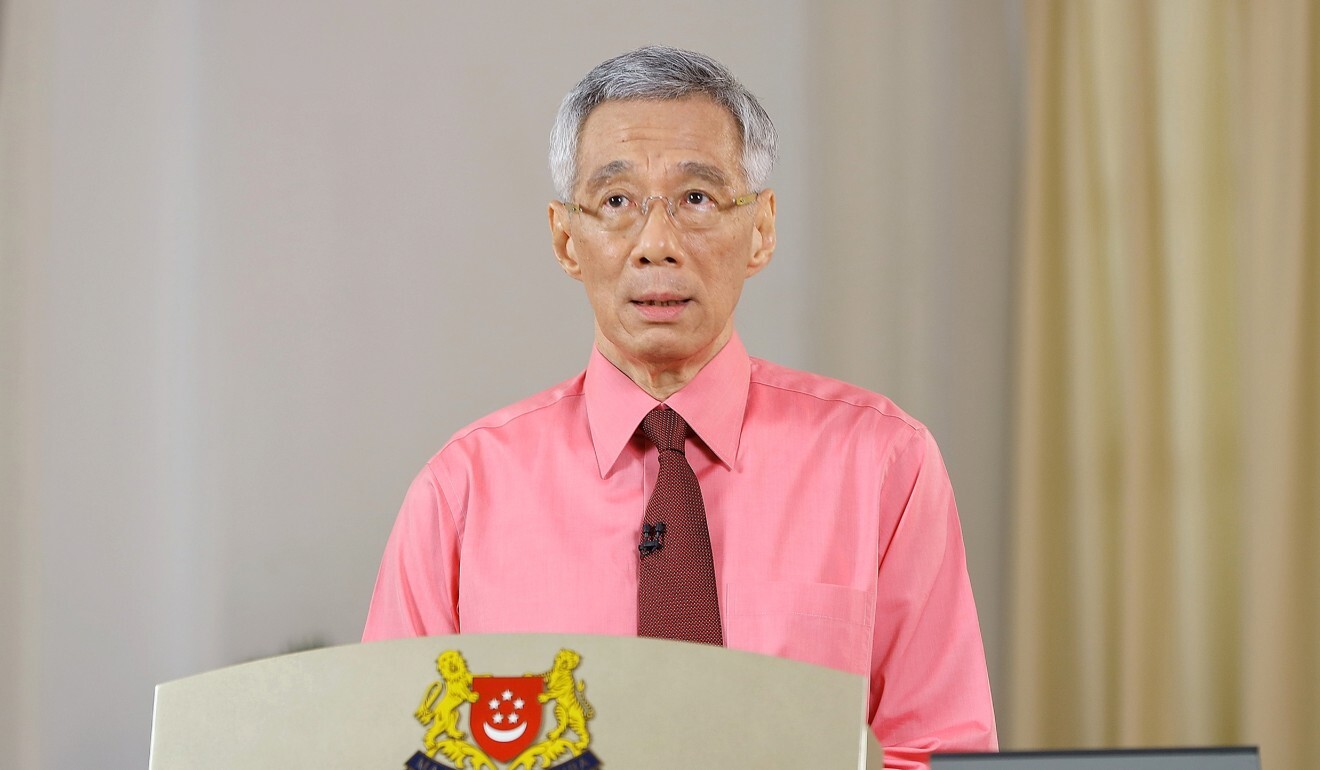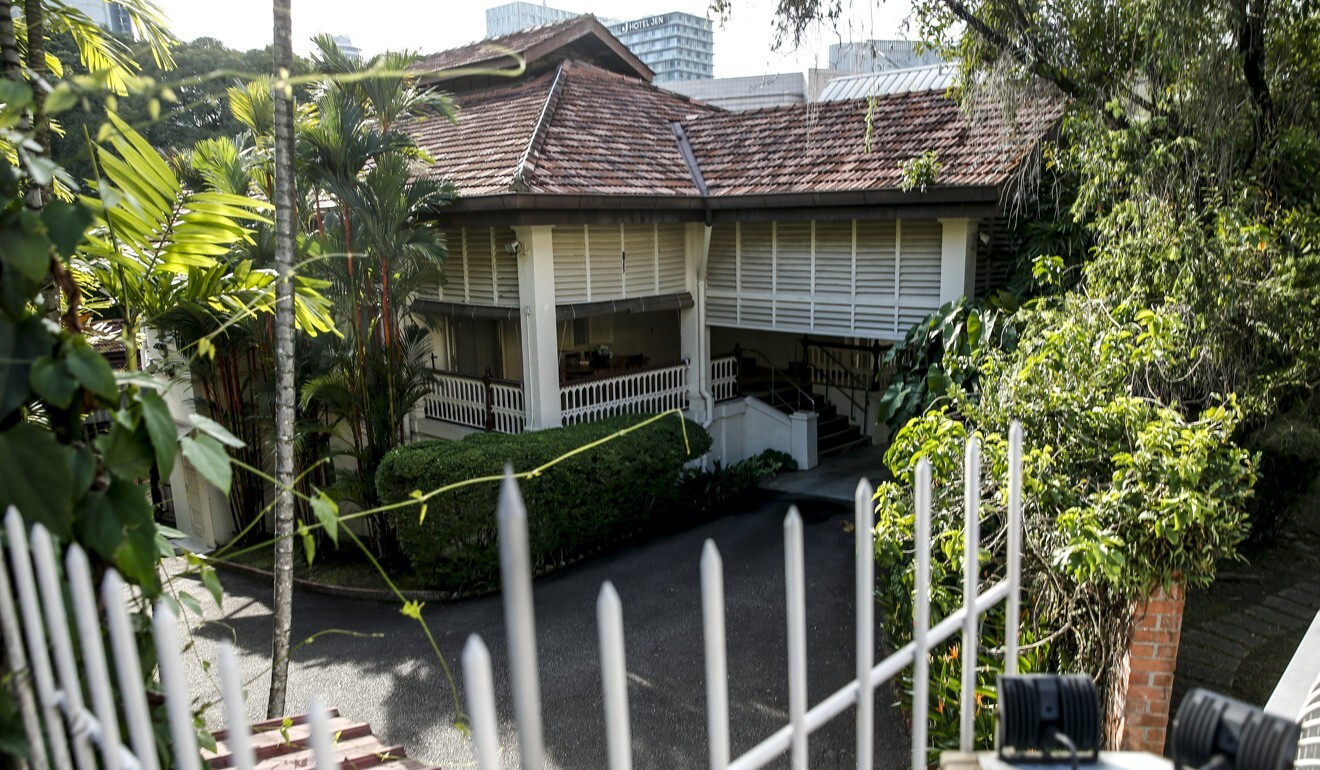We warmly welcome Mr Lee Hsien Yang as a #psp member. It's time for change. #youdeservebetterSG https://t.co/NnyABWoKtl
— Progress Singapore Party (@ProgressSgParty) June 24, 2020
Singapore PM’s brother Lee Hsien Yang joins opposition party ahead of July 10 election
- He has joined the Progress Singapore Party formed by Tan Cheng Bock, a former stalwart of the ruling People’s Action Party
- Hsien Yang and his sister Lee Wei Ling are locked in a quarrel with their older brother, Prime Minister Lee Hsien Loong, over the fate of their late father Lee Kuan Yew’s house

Singapore Prime Minister Lee Hsien Loong’s estranged younger brother Lee Hsien Yang has formally joined the ambitious new Progress Singapore Party (PSP) formed by an establishment rebel, in the first major twist ahead of the country’s July 10 general election.
Lee Hsien Yang, 62, joined the PSP’s leader Tan Cheng Bock in an early morning walkabout on Wednesday morning in the Tiong Bharu market.
Wearing a red-and-white party T-shirt and cap, the former corporate figure remained coy on his plans, saying voters would find out whether he would contest the polls when he was “ready to disclose”.
Asked how he would contribute to the party, he said “it’s not difficult to guess”.
“I joined the party because I think that Dr Tan is committed to doing the right thing for Singapore and Singaporeans and he loves the country. And he has brought together a group of people who share his vision, which I believe will build a better Singapore,” he said.
Lee Hsien Yang added that he was concerned about a range of issues, including governance standards in the country and income inequality.
Tan said the younger Lee had joined the party about three months ago but was only handed his membership card on Wednesday due to the coronavirus pandemic.
He said it gave him “great pleasure” to welcome Lee Hsien Yang to the party.
“He is not just an ordinary person. His father [Lee Kuan Yew] is the founder of Singapore,” Tan said. “The fact that he decided to join us is a clear indication that the current team did not follow what his dad wanted.”
As the children of the country’s revered independence leader Lee Kuan Yew, the Lee siblings are considered part of the island state’s “First Family”. Prime Minister Lee leads the long-ruling People’s Action Party (PAP) co-founded by their father.
The brothers have been publicly at odds with each other since 2017 over the fate of the late patriarch’s bungalow.
Last July, Lee Hsien Yang said he “wholeheartedly” supported the newly formed PSP.

Tan, 80, was a vocal dissenter within the PAP during his 1980-2006 tenure as a backbench MP, and he nearly defeated the ruling party’s preferred candidate in a presidential poll in 2011.
The veteran politician said he formed the new party as he was concerned about the erosion of accountability and governance standards after long years of PAP rule in the city state.
Earlier, the PSP – which is one of 12 opposition parties expected to contest the polls – said it would field 24 candidates in the election.
Polls will be held for 93 parliamentary seats in 14 single-seat districts and 17 group representation constituencies (GRCs) if there are no walkovers. Tiong Bahru market is located within the Tanjong Pagar GRC that Lee Kuan Yew helmed during his six-decade political career.
The public quarrel between Lee Hsien Loong – the eldest of three children – and his two siblings Lee Hsien Yang and Lee Wei Ling dominated the public consciousness when it first surfaced in 2017.
The younger siblings triggered the saga by accusing their brother on social media of abusing his executive powers to scuttle their efforts to demolish the family bungalow as their father wanted.
Prime Minister Lee, 68, later went before parliament to dispel these allegations and offer assurances that he had recused himself from the government’s decision-making process on the issue.

He also said the government would not change the status quo of the house – it is owned by Lee Hsien Yang and occupied by Lee Wei Ling – as long as Lee Wei Ling continued to live there.
While an uneasy truce has existed for some time, Lee Hsien Yang has occasionally used his widely followed Facebook account to attack his politician brother.
Last week, in a post that coincided with the third anniversary of the start of the public feud and came just ahead of the election announcement, he shared a post written by his sister saying that events since 2017 have reinforced the younger siblings’ assertion back then that they did not trust their elder brother as a brother or leader.
Prime Minister Lee, who succeeded Lee Kuan Yew’s successor Goh Chok Tong as prime minister in 2004, is expected to lead the PAP to a relatively comfortable victory in the election.
The PAP has held a parliamentary supermajority since 1968 and its vote share has never fallen below 60 per cent since then.
Also on Wednesday, Deputy Prime Heng Swee Keat – the de facto successor to Prime Minister Lee and the PAP’s No 2 leader – unveiled the party’s first slate of new candidates.
Among them were former army brigadier-general Desmond Tan and Edward Chia, the co-founder and managing director of Timbre Group, a well-known food, beverage and entertainment company. The ruling party usually replaces about a quarter of its MPs at every general election.
It introduced 24 new candidates in the 2011 and 2015 elections, with a large number of the newcomers coming from the civil service and military.
Separately, the Elections Department offered further details on its plan to conduct the poll in the safest possible manner amid the coronavirus pandemic. It urged candidates to keep their face masks on as far as possible, even when they were speaking to reporters on the campaign trail or when recording broadcasts.
“All political parties and candidates are strongly encouraged to exercise positive leadership and set a good example to the public, by following these best practices,” the department said.
Candidates must adhere to prevailing social distancing guidelines that bar people from gathering in groups of more than five.
Additional reporting by Kok Xinghui